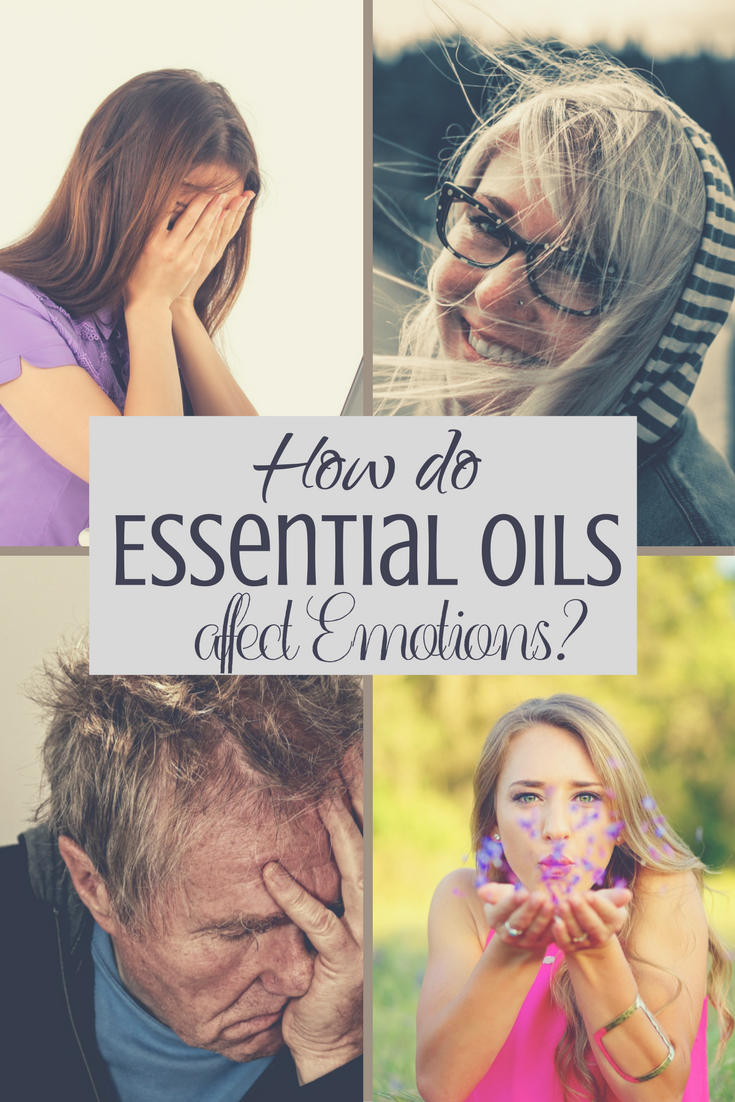
Chances are at some point, you may have heard that Essential Oils can help support healthy hormones, help to support a healthy respiratory or immune system, or even assist with emotional stability.
The truth is, essential oils can do a LOT of those things, and more, for people of all ages. They can help motivate you to get ready for work every morning, and help give you that push out the door to go to the gym 😉 They can also help you cope a little easier when you are having stressful days at work or are simply just overwhelmed at home – from housework or perhaps your own children.
But do they really have that much of an impact on your emotions and mood as we think? And if they do, how so?
One of the biggest reasons we turned to essential oils several years ago was to find support for my husband following a lengthy military deployment. He was looking for alternatives to traditional western medicine to help him cope with the emotional rollercoaster he experienced daily – and we thought essential oils might be a better route.
Our sense of smell is 10,000 more sensitive than our other senses. Scent travels faster to the brain with smell than it Does with sight, or even sound.
In an attempt to help ourselves understand the oils we use daily a little better, we did our own research to see just how essential oils affect the brain and as a result, our emotions.
How do Essential Oils affect the Mind?
Your sense of smell is much more accurate than any of your other senses. Your ability to smell comes from sensory cells, called Olfactory Sensory Neurons, found in a small patch of tissue very high in your nose. Those cells connect to your brain.
Each of those sensory neurons has one odor receptor – and molecules released by substances around us stimulate these receptors. Once your neurons detect your molecules, they send messages to your limbic lobe of your brain.
The limbic lobe is a group of brain structures that is below the cortex of the brain – it includes the amygdala and the hippocampus. Your limbic lobe (system of brain structures) is directly connected to the parts of your brain that control many aspects of your body – hormone levels, stress, memory, breathing, heart rate, and more.
As a result, essential oils can have a relatively profound effect – because that stimulation of hormones and chemicals can drastically affect physiology and behavior.
Your Emotional Brain
The only way to stimulate the emotional brain is through your sense of smell – which is one of the reasons why Essential Oils can work so incredibly well. Feelings of depression, fear, anger, happiness, joy and even anxiety all originate from the limbic lobe of the brain.
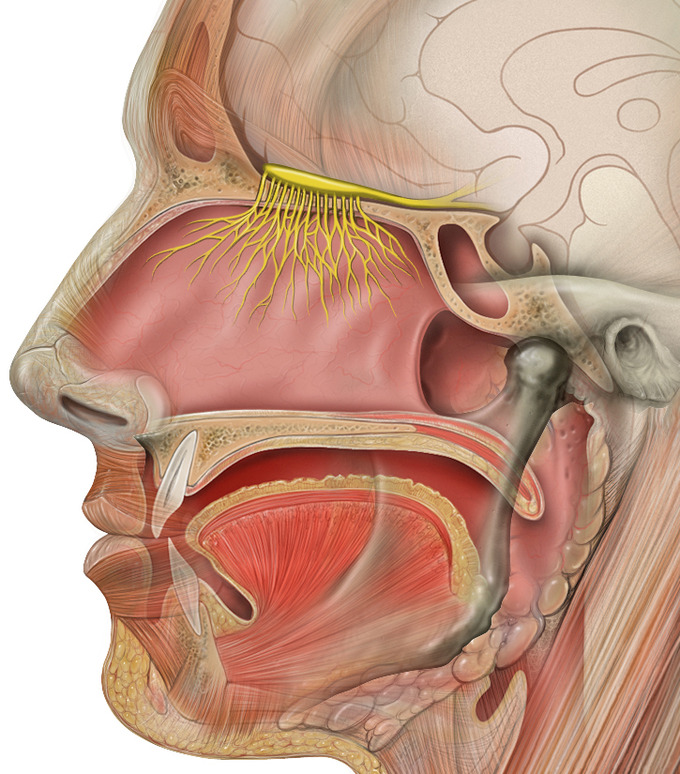
Scents can evoke a memory in a matter of milliseconds – as a result, essential oils can help those feelings and struggles surface so that we can release them effectively.
When combined with prayer, massage therapy, psychotherapy, dietary changes and even counseling, we can experience profound changes.
The importance of the OlfactoryBulb
The Olfactory bulb is the most forward part of the brain, and has several layers. it helps to transmit that smell information from the nose to the brain, and is necessary for sense of smell.
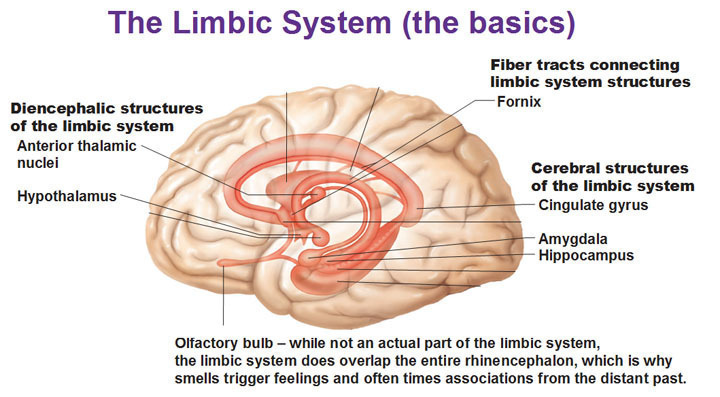
Hair cells are the receptors in the olfactory that are what respond to particular chemicals – humans have about 40 million olfactory receptors. These receptors react to a chemical molecules shape, size or electrical charge.
Your olfactory response then carries those signals to the brain areas that are part of the limbic system. The limbic system of your brain then influences your emotional behavior and memory – which is part of the reason that when you smell something, you trigger memories that bring back memories that relate to that smell.
What Happens When you Can’t Smell?
Of course, there are always times when you can’t seem to smell well – perhaps when you are sick and you have the typical cold and flu. When you are sick and your nose is stuffed up, you can’t effectively “smell” – because the molecules that carry smell cannot reach the olfactory receptors.
Essential Oils for Healing
Many people turn to prescription drugs to find relief from psychological symptoms, but that doesn’t come without disruption to other body systems.
Essential Oils can help alleviate symptoms at a cellular level through it’s therapeutic properties. Essential Oils can be stimulating (Peppermint), calming (Lavender), sedative (Cedarwood), balancing (Stress Away), and more.
Below are 5 essential oils for supporting healthy emotions:
Cedarwood: Helps support healthy focus and encouragement during feelings of abandonment.
Lavender: Helps support relaxation and calming.
Roman Chamomile: Helps support feelings of peace, love and acceptance.
Bergamot: Uplifting and will help support healthy confidence levels, while also helping in the areas of self love and self worth.
Frankincense: Powerful cleanser of the spirit – helps support grounding during times of trouble, and helps support positive thoughts during times of negativity.

Be Calm Roller Blend
A roller blend is a wonderful way to find emotional support, and this easy “Be Calm” roller recipe blend will help you find relief while also give you encouragement in times of need:
Ingredients
- 3 drops Lavender Essential Oil
- 3 drops Orange Essential Oil
- 2 drops Cedarwood Essential Oil
- 2 drops Frankincense Essential Oil
- Carrier Oil like Sweet Almond
- 10ml Roller Bottle
- Roller Bottle Labels
Instructions
- Add the essential oils in the 10ml roller bottle and top off with carrier oil.
- Snap on the roller ball and shake well to mix.
- Attach label.
- Apply to pulse points behind the ears and on the wrists as needed.
Have you had success with supporting your emotions with essential oils? What essential oil or blend has helped you the most?
Find out more about essential oils with 25 DIYs with Essential Oils, and a large list of Essential Oil DIY materials.
If you are ready for an unbelievable journey to better health through essential oils, you can pick up more information on the Young Living Premium Starter Kit by heading here.
References:
How do Essential Oils Affect our Mind and Our Emotions. Retrieved from http://www.biospiritual-energy-healing.com/essential-oils-affect-our-minds.html
Smell – The Nose Knows. Retrieved from https://faculty.washington.edu/chudler/nosek.html
Essential Oils that can Ease Unpleasant Emotions. Retrieved from https://www.naturesgift.com/aromatherapy-information/how-to-use-essential-oils/ease-emotions/
Olfaction: The Nasal Cavity and Smell. Retried from https://www.boundless.com/psychology/textbooks/boundless-psychology-textbook/sensation-and-perception-5/sensory-processes-38/olfaction-the-nasal-cavity-and-smell-164-12699/



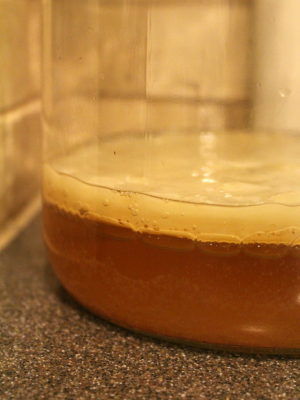
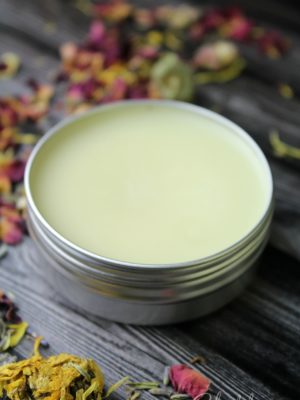

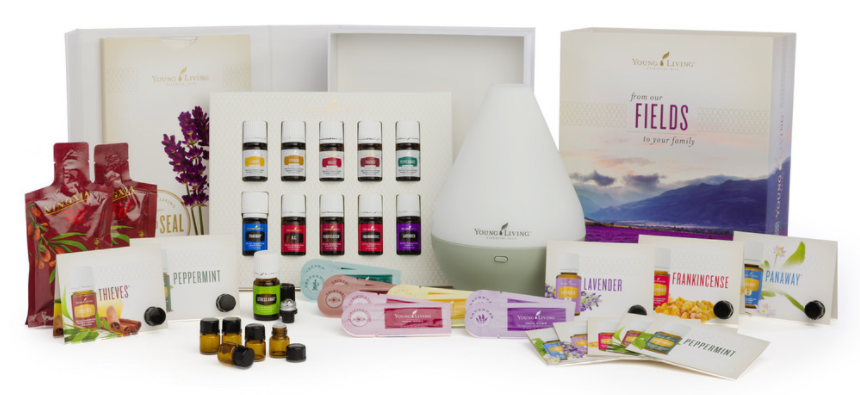

Leave a Reply